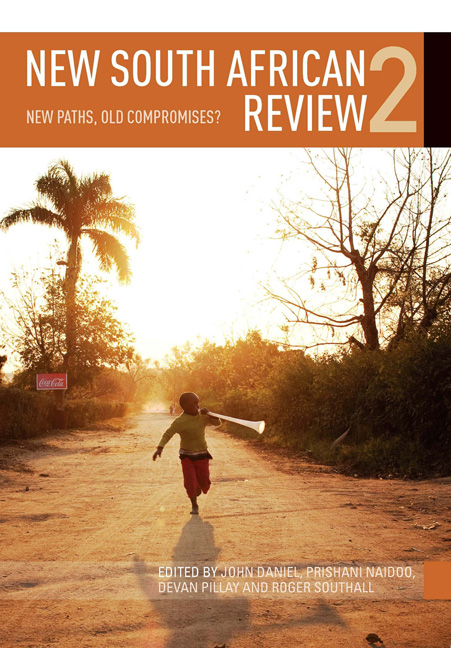Book contents
- Frontmatter
- Contents
- Preface
- Introduction: New paths, old (com)promises?
- PART 1 POLITICS AND INTERNATIONAL
- PART 2 ECONOMY AND SOCIETY
- PART 3 ENVIRONMENT
- PART 4 MEDIA
- Introduction: Media transformation and the right to know
- Chapter 17 The print media transformation dilemma
- Chapter 18 The South African Broadcasting Corporation: The creation and loss of a citizenship vision and the possibilities for building a new one
- Contributors
- Index
Introduction: Media transformation and the right to know
from PART 4 - MEDIA
Published online by Cambridge University Press: 23 March 2018
- Frontmatter
- Contents
- Preface
- Introduction: New paths, old (com)promises?
- PART 1 POLITICS AND INTERNATIONAL
- PART 2 ECONOMY AND SOCIETY
- PART 3 ENVIRONMENT
- PART 4 MEDIA
- Introduction: Media transformation and the right to know
- Chapter 17 The print media transformation dilemma
- Chapter 18 The South African Broadcasting Corporation: The creation and loss of a citizenship vision and the possibilities for building a new one
- Contributors
- Index
Summary
The chapters in this section address a key issue facing our country – media transformation – in the context of a perceived attack on the freedom of expression and access to information which form the bedrock of democratic rights.
Three proposed measures by the ruling party and government have raised alarm: the Protection of Information Bill, which threatens to undermine the laudable Promotion of Access to Information legislation, passed more than a decade ago, by blocking access to information that could expose corruption or negligence by government officials; the Media Appeals Tribunal, an ANC proposal to replace media self-regulation with a state-appointed body that has much stronger punitive powers, including imprisoning journalists; and a proposal to centralise all government advertising, which can be used to punish media that cast government in a bad light. Taken together, these proposals are ominous, and have given rise to the Right2Know campaign, an impressive array of civil society organisations that has the support of Cosatu as well as prominent individuals such as former minister of Intelligence, Ronnie Kasrils. Cosatu also directly participates in another civil society initiative, the SOS: Support Public Broadcasting Coalition which, as Kate Skinner discusses in this section, has played a critical role in trying to ensure that the public broadcaster meets its obligations to inform and educate the country's citizens.
Media transformation is directly linked to the democratic principle of access to information, encapsulated by the public's right to know about what happens in government and in private corporations that has a direct impact on their daily lives as workers, consumers and citizens. It goes to the heart of questions of power – of those in positions of authority who usually prefer to limit access to information that might undermine their power. The mass media play a critical role in giving the public access to information and knowledge by, inter alia, exposing corrupt practices, negligence and incompetence, and allowing the public to hold governments and corporations to account for their actions.
In this sense, the narrow practice of ‘transformation’ in South Africa as increased racial (and, to a lesser extent, gender) representivity, does address some concerns about media imbalances as they relate to the white male power structure that characterised media ownership and control under apartheid.
- Type
- Chapter
- Information
- New South African Review 2New paths, old compromises?, pp. 342 - 344Publisher: Wits University PressPrint publication year: 2012



